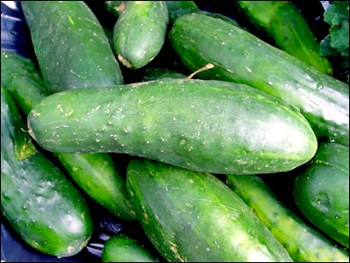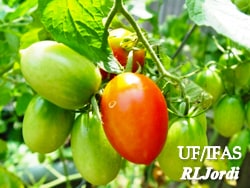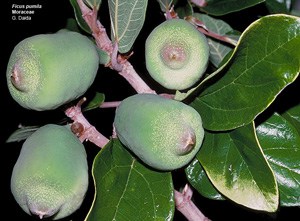____GARDEN TALK ____
EDITOR’S NOTE: University of Florida/IFAS Extension Director for Nassau County and Horticulture Agent III, Rebecca Jordi addresses questions about landscaping and gardening in northeast Florida. She is also a University of Florida faculty member. _________
(See also listing of June 2011 Nassau County Extension gardening classes and clinics at bottom of article.)

JORDI: This is a fairly uncommon occurrence on newer hybrid varieties. However, many have been experimenting with older, heirloom species which has resulted in getting this question twice this week.
Bitterness is due to the formation of two specific terpenoid compounds which are found in cucurbit plants. Cucurbit plants include squash, cucumbers, some melons, pumpkins and gourds. The terpenoid compounds can be found in seedlings, roots, stems, leaves, and fruit. There are two genes which control bitterness in cucumber; a dominant one produces extremely bitter fruit and a recessive one sometimes found in the leafy portion of the plant and in the fruit (fleshy part of the plant). It is rare for bitterness to manifest itself but when it does the bitter taste will be more heavily located in the stem end of the fruit or just below the rind or peel.
Weather (cool temperatures) and environmental (shady sites) conditions may trigger the bitter taste to show up in vegetables grown in our home gardens. Nothing can be added to the soil to change the taste of cucumbers once they start to mature. Bitter taste may also occur if the cucumbers are left on the vine too long or if they are stored with other very ripe fruit and vegetables.
What is the final answer? Peel the skin off the cucumber and cut off the ends, if it still tastes bitter to you then toss it in the compost bin. Be sure the plant is receiving adequate irrigation, sufficient sunlight, and pick the cucumber when it is smaller rather than larger. Consider adding in some hybrid cucumber varieties to your garden so you will have a smaller chance for bitterness to be displayed. (Photo is from the University of Florida.)

JORDI: Determinate tomatoes are the smaller bush type which generally only grow to about 4 feet tall and can easily fit in the small support cages sold at most garden centers. The most common variety of determinate tomato is “Celebrity” which is a nice, medium-sized tomato. Your friend was probably thinking since the determinate tomato would take less space it might be easier for you to work with as a beginning gardener.
Indeterminate tomatoes are the true vine types which under proper conditions (warm weather) can continue to grow, flower and produce fruit until the first cool weather appears. Indeterminate tomatoes may reach 10 feet or more in length, if conditions are perfect. You would need plenty of room to grow this type of tomato and provide ways to stake the heavy vines. Large support cages are available but they may not be sufficient if you do not prune and pinch sucker formation.
You could also plant determinate tomatoes in the late summer and possibly have a supply of fall tomatoes, too. I have done this and some years are more successful than others. But no matter which one of the tomato types you choose, nothing tastes as good as a home grown tomato – you will not be sorry you made the effort. (Photo is of Roma tomatoes.)
QUESTION: My neighbor has something called a fig vine and it has been dropping large, bell-shaped fruit. The fruit are about 2-3 inches long and it has been pretty messy. What is it? JT

I just experienced the fruit drop at a location on Amelia Island and was astounded at the high fruit production from these vines. The owner told me it has been the highest amount of fruit he has ever seen but his plants have been around longer than he can remember.
Creeping fig does not appear to be too picky about the soil conditions. It has been known to damage the outer stucco veneer of walls or buildings which may require repairs after a few years. Clipping the vines will keep them from getting out of control. By the way, the fruit is ornamental only – it is not edible. See also publication from the University of Florida – Dr. Ed Gilman. (Photo is from the University of Hawaii.)
JUNE 2011 GARDENING CLASSES AND CLINICS IN NASSAU COUNTY, FLORIDA
Master Gardener Claudie Speed will conduct a Landscape Matters Class on Tropical plants, on June 8, 2011 from 10 am until 11 am. Speed will discuss landscape plants that grow well during our hot summer months. The session will be held at the Nassau County, Florida Demonstration Garden in Yulee. The class is free and open to the public. For more information, see the Nassau County Extension website at: http://nassau.ifas.ufl.edu/horticulture/landmatters/landmatters.html, or call the Extension office at 491-7340. Master Gardener propagated plants will be available for sale after the session.
______________
On June 13, 2011 from 10:00 am until 2:00 pm, Becky Jordi, County Extension Director/Horticulture Extension Agent will conduct a Plant Clinic at the Yulee Extension Office (A1A and Pages Dairy Road). All County residents are invited to bring plant samples showing problems in their landscapes. Problems will be identified and solutions offered for correction. There is no fee for this service. For information call 491-7340.
_________________
On June 27, 2011 from 10:00 am until 2:00 pm, Becky Jordi, County Extension Director/Horticulture Extension Agent will conduct a Plant Clinic at the Yulee Extension Office (A1A and Pages Dairy Road). All County residents are invited to bring plant samples showing problems in their landscapes. Problems will be identified and solutions offered for correction. There is no fee for this service. For information call 491-7340.
_________________
On Tuesday June 28, 2011 agents from Nassau, Duval and Clay counties are conducting a LCLM/Pest Management class for industry professionals. (Please note the registration deadline is June 23, 2011. ) The class is 8:15 am until 3 pm. Pre-registration is at 7:15 am. Topics addressed will be the complete information needed to successfully take the pest management certification exam. The full day is required before sitting for the exam. The exam is optional and given the day of the class. Lunch is provided. A total of 6 CEUs are provided: 3 L&O, 3 O&T, 3 Private, 3 LL&O, 3 LCLM, 3 CORE. Individuals seeking re-certification may attend the class for 4 hours for the $30.00 price.

County Extension Director
UF/IFAS Environmental Horticulture
Nassau County Extension
543350 U.S. Highway #1
Callahan, FL 32011
904 491-7340 or 904 879-1019
